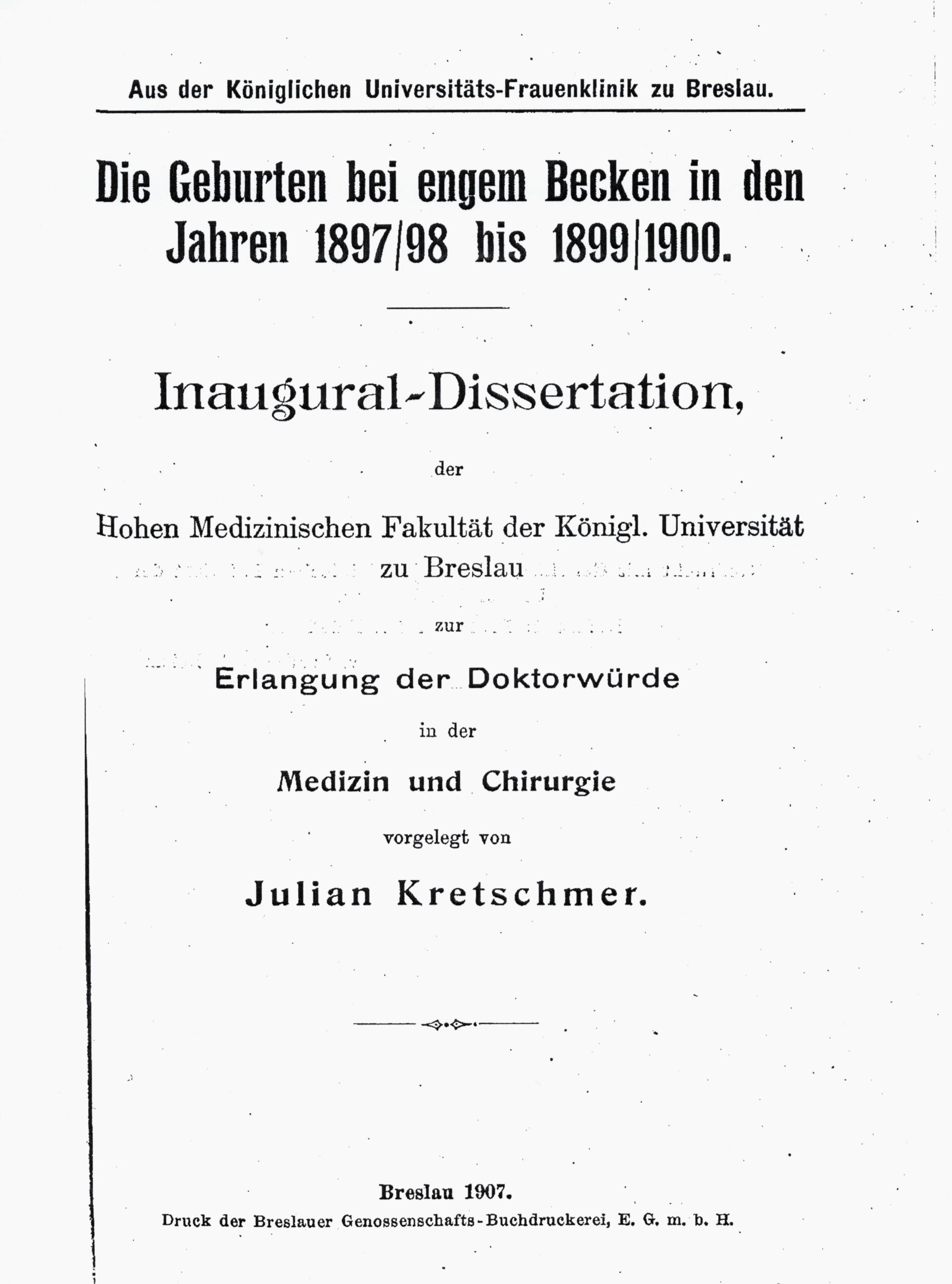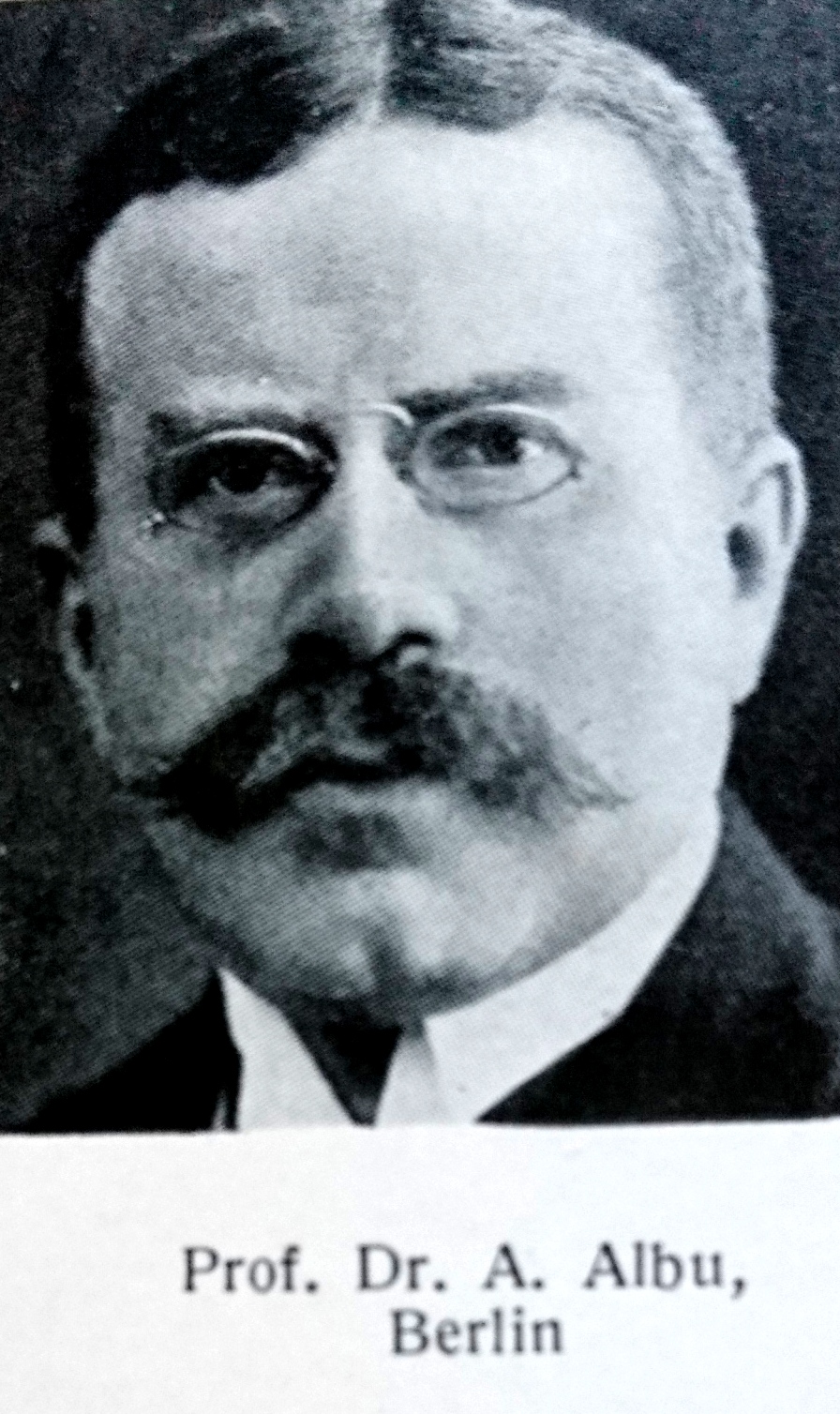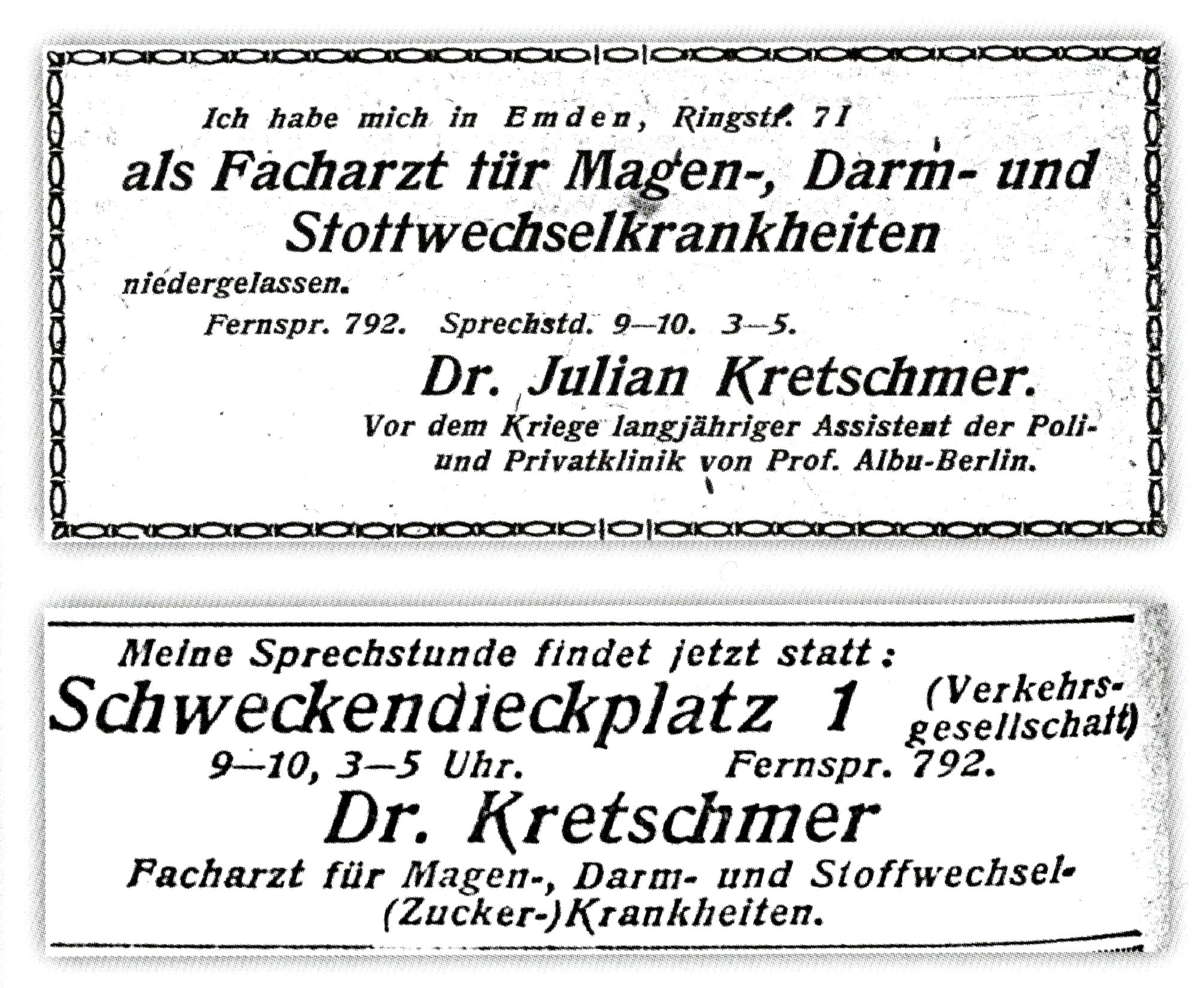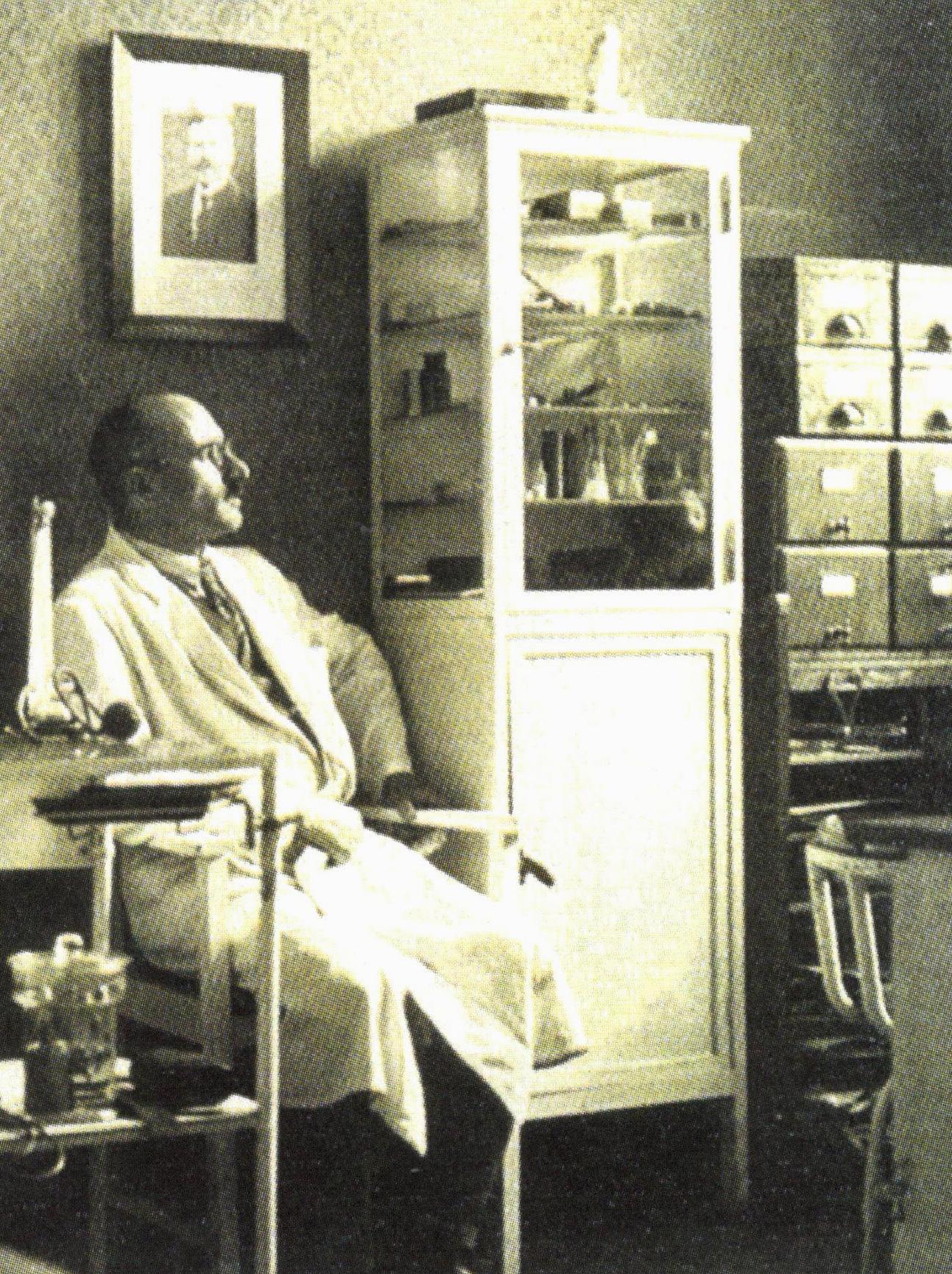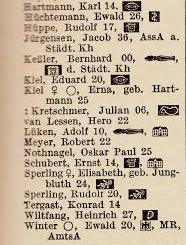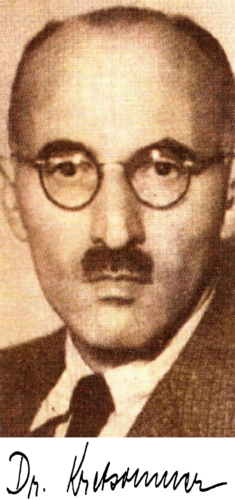Dr. med. Julian Kretschmer
- Leobschütz former Schlesien/now Głubczyce, Poland, 15.09.1881
- Petach Tikwa, Israel, 16.06.1948
- Member since 1927
- Escaped to Palestine in 1939
- Specialist in gastrointestinal and metabolic diseases including X-ray diagnostics
Julian Kretschmer was born the son of the merchant Ferdinand Kretschmer and his wife Goldine, née Freund. “I, Julian Kretschmer, Prussian citizen, Jew, living in Breslau [today Wrocław, Poland, note H Je], was born in Leobschütz on 15 September 1881. I attended the Königl. König-Wilhelms-Gymnasium in Breslau, from which I graduated on Easter 1901. I then studied medicine, first in Breslau for four semesters, then for one semester in Freiburg and finally again in Breslau for four semesters. I completed the state examination in February 1906”, Kretschmer states in the curriculum vitae of his dissertation. He received his licence to practise medicine the same year. He was awarded his doctorate in Breslau in 1907 with the thesis “Die Geburten bei engen Becken in den Jahren 1897/98 bis 1899/1900”, which he had written at the Royal University Women’s Clinic in Breslau.
Education and Workplaces
Julian Kretschmer undertook training in internal medicine at Prof. Albert Albu’s Berlin Polyclinic and Private Clinic from 1907, with an early focus on gastrointestinal and metabolic diseases. Albert Albu was one of the leading and early gastroenterologists in Berlin at that time, along with Ismar Boas, Hermann Strauss and Theodor Rosenheim and one of the co-founders of the Society for Digestive and Metabolic Diseases. In addition to his clinical work, Kretschmer worked experimentally with Ernst Salkowski in the physiological-chemical department of the Institute of Pathology at the Charité in Berlin. Albu entrusted him with the establishment of an X-ray department at the St. Franziskus Hospital in Berlin in 1910, where Albert Albu worked for the Department of Internal Medicine.
Kretschmer married Elsbeth Valk (born in 1891), a merchant’s daughter from Emden, East Frisia, in 1913. Their daughter Ruth was born the following year. Julian Kretschmer actively participated in the First World War from 1914 to 1918.
For Kretschmer, as for many others, the First World War and its consequences meant a deep caesura. He saw no prospects for a clinical-scientific career in Berlin. With the support of his parents-in-law – the Valks – he moved to his wife’s birthplace in East Frisia. Jakob and Betti Valk ran a well-known department store in Emden. In Emden, Kretschmer opened a specialist practice for gastrointestinal and metabolic diseases including X-ray diagnostics in Emden in 1919. It was the first of its kind in northwest Germany. The practice became extremely successfully due to Kretschmer’s specialisation and expertise and very quickly had a large catchment area beyond the borders of East Frisia.
After 1933
From the spring of 1933, Kretschmer and his family experienced the anti-Semitic hostility and persecution during the Nazi dictatorship. In 1934 he lost his health insurance licence. In 1937, his 23-year-old daughter Ruth fled to Palestine. In June 1938, the accounts of the Kretschmers were frozen by order of the customs investigation office in Bremen. Kretschmer gave up his practice and flat at Schweckendieckplatz in Emden in July 1938 and moved into the house of his parents-in-law – the Valks – at Neutorstrasse 14 together with his wife. On 30 September 1938, Julian Kretschmer’s licence to practise medicine was withdrawn.
Kretschmer was imprisoned at Sachsenhausen concentration camp until 16 December 1938 as a result of the November pogrom in 1938.
Escape to Palestine
Julian Kretschmer and his wife fled Germany at the beginning of 1939. They had previously paid a “Judenvermögensabgabe” (atonment tax for Jews in the aftermath of Reichskristallnacht – night of broken glass) and the “Reichsfluchtsteuer” (tax Jews had to pay to escape from the Reich and a means to prevent capital flight). The Kretschmers reached Palestine on 27 February 1939, where they lived in extremely modest conditions. They had to earn their living by doing odd jobs. Julian Kretschmer did not receive a licence to practise medicine until 1943, but was only able to do so to a very limited extent. He had to move the location of the practice from Ra’anana to the settlement of Kfar Felix Warburg in 1944. The financial situation of the Kretschmers remained precarious.
Julian Kretschmer entered the scientific prize competition organised by Harvard University, Cambridge, Massachusetts, in March 1940, with the title “My Life in Germany before and after 30 January 1933”. The prize had been announced for German emigrants in 1939 and was addressed to all “who knew Germany well before and during Hitler”.
180 manuscripts met the criteria. In 1939, most of the participants lived in the USA, 20 of those who took part in the competition lived in Palestine. The typescripts, including those of the doctors Käte Frankenthal and Hertha Nathorff, who also took part in the competition, are preserved at the Houghton Library at Harvard University. Kretschmer’s autobiographical notes provide a comprehensive insight into his experience of conditions in Germany during the Kaiserreich, the period of the Weimar Republic and especially after the beginning of the Nazi dictatorship, including his escape to Palestine in 1939. In addition to his professional path, Kretschmer’s eyewitness account – which he wrote before the Shoa – very precisely describes everyday life under Nazi rule, the increasing anti-Semitism and the attitudes of his colleagues and patients.
Julian Kretschmer died from a tumour in Petah Tikva on 16 June 1948.
His wife Elsbeth Kretschmer left Israel in September 1953, lived for a few years in Frankfurt a. M. at the Jewish senior citizens’ home at Gagernstrasse 36 and returned to her daughter in Israel before her death. She died near Tel Aviv in January 1964.
Julian Kretschmer’s sister – the teacher and writer Dr. phil. Elisabeth (Ella) Kretschmer – born in 1875, lived in Berlin and was deported to Auschwitz on the 30th “East Transport” in February 1943, where she was murdered. Kretschmer’s mother-in-law, Betti Valk, was deported to the Theresienstadt ghetto in 1943. She died at the ghetto at the age of 82 in January 1945.
Acknowledgements
We would posthumously like to thank Gesine Anna Janssen (1948 – 2022), Uttum – Krummhörn, East Frisia, for her comprehensive study of the biography of the Kretschmer – Valk family, for her many suggestions and for the conversations we shared in 2014 / 15. Most of all, she did an excellent analysis of Kretschmer’s manuscript, which he submitted to the Harvard University prize competition in March 1940. She made it available to the public and a basis for commemorating Julian Kretschmer’s life and work.
Biography translated by Rachel Hinterthan-Nizan
Sources and Further Reading
Sources
